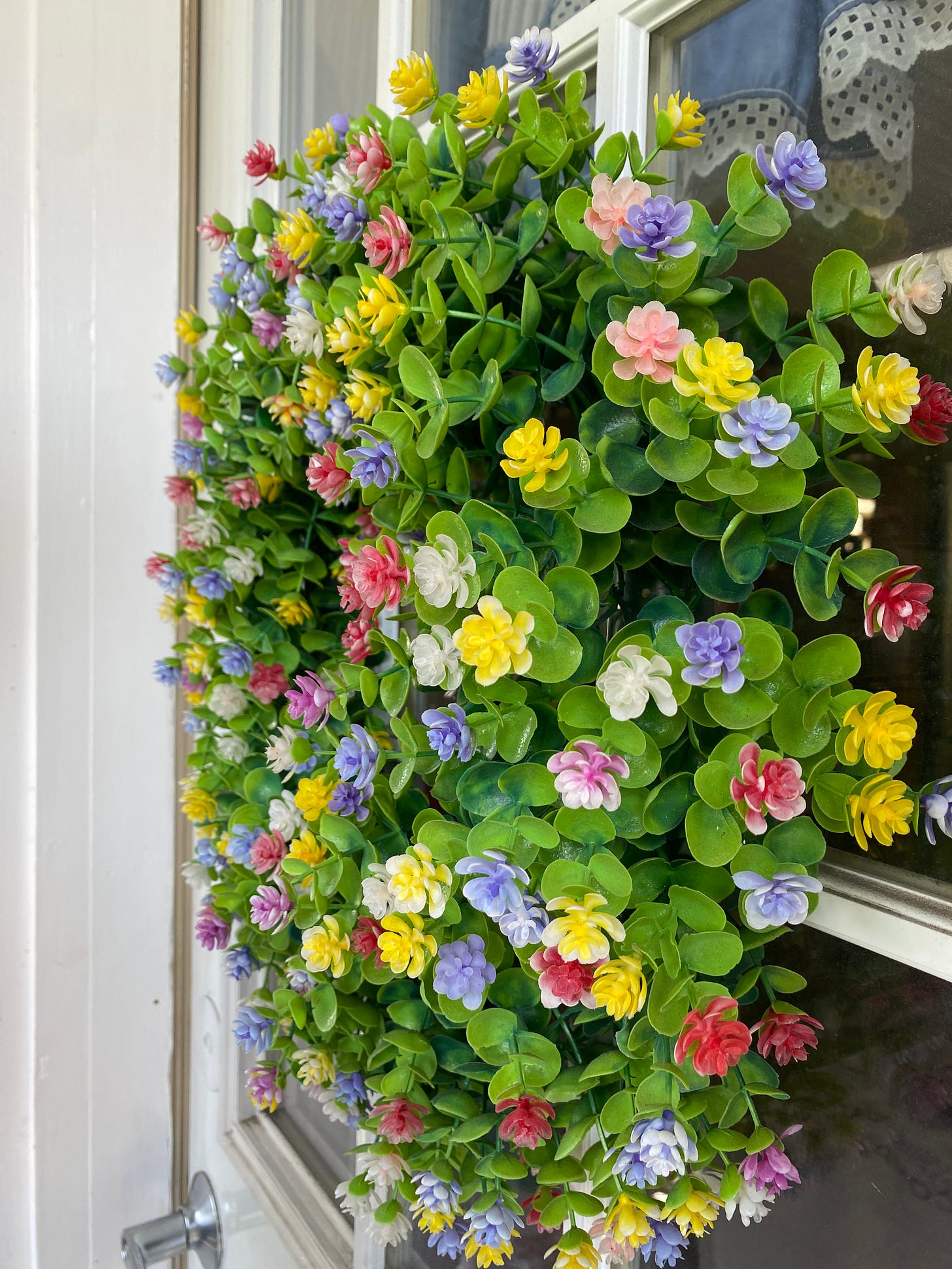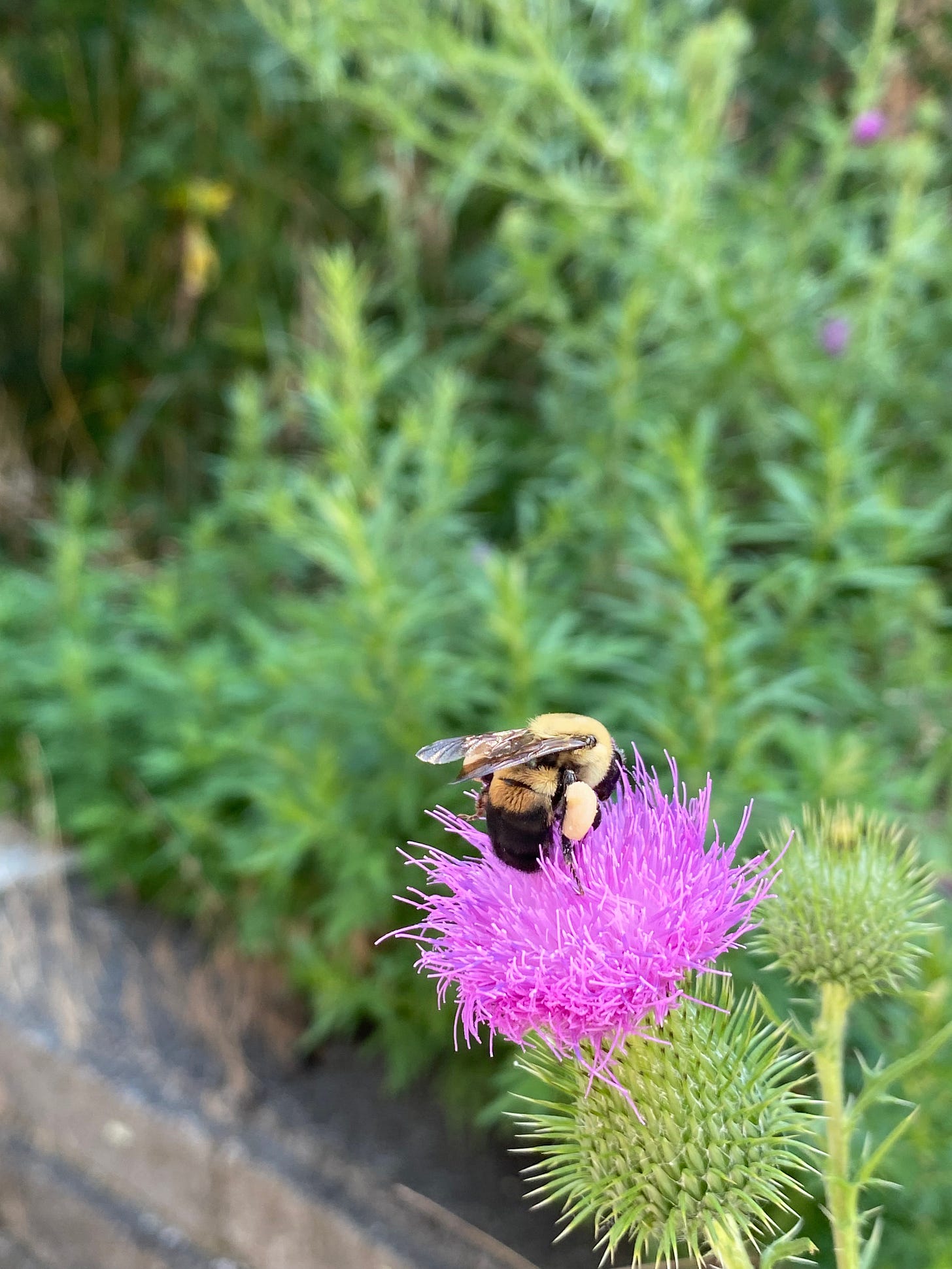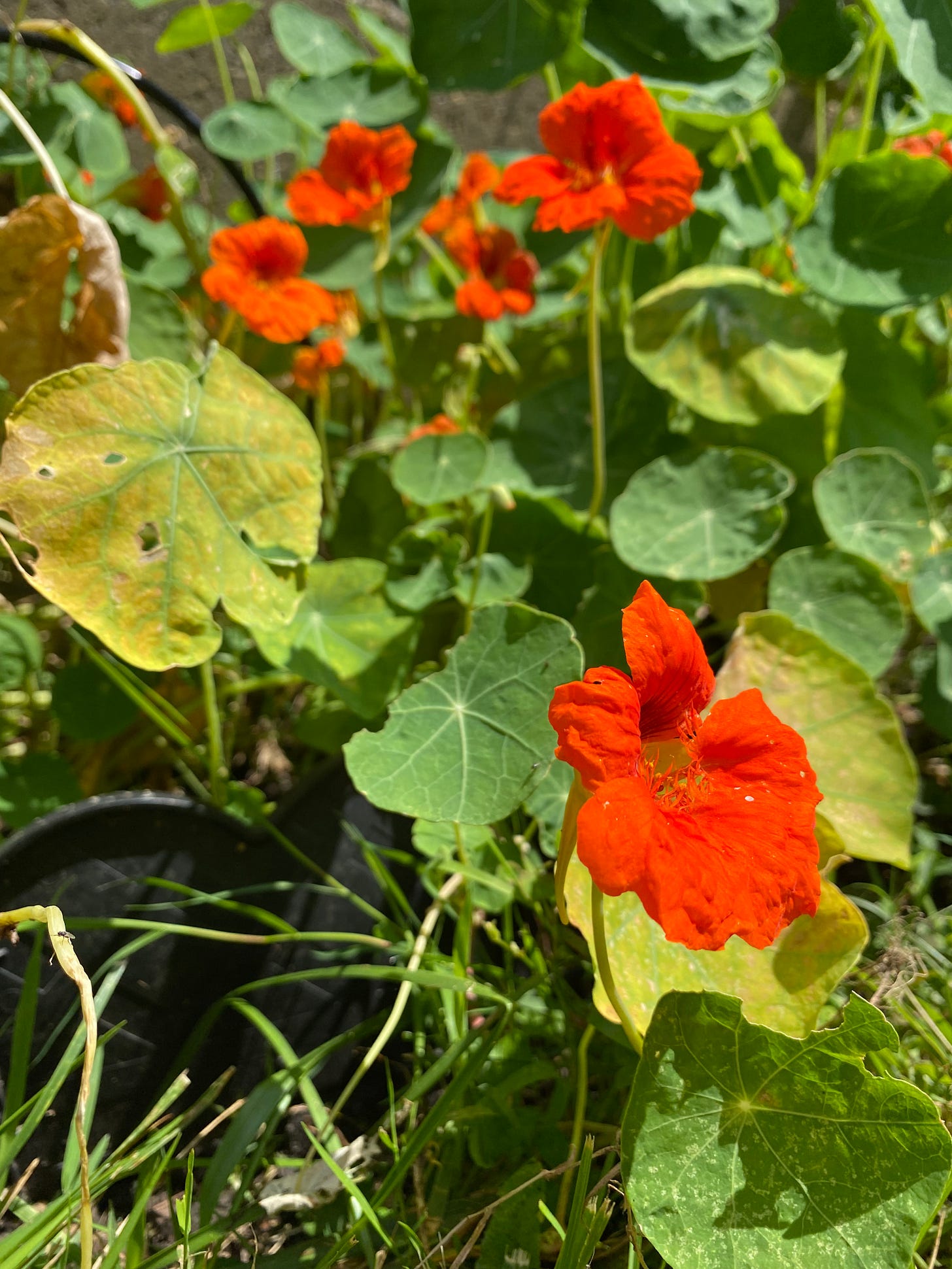Miranda's circling points on map. The person standing next to her has missed the rush, the craze. Miranda’s map will guide the latecomer towards what others have seen, though conditions now are less ideal, perhaps more dangerous. It's too late for the tour but perhaps, by peering over fences, a few secreted gardens can still be seen.
And perhaps I'm making the Swissvale Edible Garden Tour sound more dramatic than it is. But on a 90 degree day, with only the most fragmentary of clouds, things feel dramatic. The sun is squeezing the last molecular secrets from my pores. Invisible waves of heat rise from the pavement. They lift me minutely then drop me extensively. Each step is like lifting myself out of bed. How could I not be dramatic?
This was the seventh annual Garden Tour, Miranda Crotsley tells me. She's a co-organizer of the event, which grew out of the Swissvale Community Action Committee. Although the tour emphasizes food growing—whether a potted pea or mini orchard—other genres of gardening are included as well. At stops across the borough, visitors can find whimsical flowers, clumping natives, and the occasional tropical passion project. Some gardens are shockingly developed, excerpted from a horticulture magazine. Others are humble yet insistent. Most are in the rear of a property, making them inaccessible to the everyday passerby. When the tour signs go up, and the crowds are allowed in, we discover that what's tucked away, what's secret, is shockingly familiar.
"Tomatoes… basil… marigolds…"
At one stop, I listen as other plant enthusiasts do what I caught myself doing only moments earlier. We're naming each plant we see, as though it were a quiz. We go suspiciously silent when we come to a plant we don't know. Or, in my case, a zinnia. I never remember the word "zinnia" when I see one. The more clever among us ask, "What is that?" Questions are like bees. They're like hummingbirds and flies. Some bolt of air from somewhere else upriver. They spread the dust of plant production. Miranda says the tour is an opportunity for gardeners in the neighborhood to get ideas for their own plots, to encounter unfamiliar plants and plant varieties. Years ago, she began to notice her favorite zucchini variety—Costata Romanesco—growing in gardens around Swissvale. She surmises that others saw the zucchini in her own garden and carried away the, now fruitful, hope of growing the same.
This year, the great commonality seemed to be animal, not botanical. Behind a McClure Street home, a gardener showed me herbs and vegetables growing in large containers, safely nestled on her back porch. It was the only way, she said, to keep the groundhogs and deer away from her precious edibles. At another stop on the same street, a couple stood over their raised beds and looked at toothmarked leaves. We tour-goers stood alongside them, inadvertent mourners at a pop-up funeral. The family of the deceased received all manner of deer-repulsing advice. Visitors listed what they believed to work: marigolds, fences, sunken fences, raised fences, sprays of animal pheromones. In that moment, it became apparent to me that no one knows how to keep deer away. Fence and chemical manufacturers rely on our ignorance of this pessimistic point.
Of course, the only way to control the deer population is to reintroduce big wild cats. The cats will reduce the deer’s numbers and, in a freakish instance no has one ever considered, devour my neighbor when he revs his motorcycle at 11:00 PM. We will have to allow for such things, in the best interests of ecology.
Not all neighbors have motorcycles. Some have experience. Miranda tells me that learning from other local growers’ experience is crucial to success. Garden guides written for large regional swaths (the “Northeast,” for instance) can only be so accurate. Someone living a quarter mile from you, however, will be familiar with the exact soil and weather conditions of concern. They'll have a good grasp on rainfall variations and which plants absolutely hate your ZIP code. Guides are written to sell, and books that tell you, "Honey, give up, it's not going to happen," don't sell. You need a neighbor who can be honest with you. A neighbor might also clue you into the history of your specific land. Contaminants like lead, often found in city soils, can negatively impact the health of digging gardeners. Miranda recommends new gardeners get their soil tested, and offers that the Penn State Extension is a reliable tester.
After the tour, many of the gardeners and tour-goers came together at the nearby Dickson Prep School for a community picnic. A few plants were free for the taking, though most attendees have reached their maximum for the season. At my table, with my plate full of panzanella salad and sprinkle cookies, there was the usual talk: the changes a city sees over time, the times we see the city changing. Pittsburgh is different than it used to be. So notable. We're technically outside the city of Pittsburgh during our conversation, but that hardly matters. Queer Ultimatum came up because of course it does. Swissvale and its gardens are very gay. If this shocks or offends, please know that the big wild cats are on their way.
After I'd had a Turner's lemonade—and after I'd learned that a single Turner's lemonade contains 100% of your sugar for the day—Miranda brought a map over to the table and started circling points. The tour was over, but some gardens remain visible from the street. She was identifying those gardens for a visitor who arrived a bit too late. It's an echo of the 2021 tour, when organizers recommended a COVID-safe “nebby neighbor” approach. That year, Swissvalians (it is not spelled “Swissvalien,” to my great annoyance) browsed each other's gardens by looking over fences, or by individually walking the grounds while the gardener responsible supervised from indoors. Even in the midst of a pandemic, we seek the drama of the hidden garden. Perhaps, if we could see each other's gardens all the time, the tour would feel like a bit of a snooze. It's the secret that keeps us excited.
Once we see a hidden garden, it's hidden no more. Other thrills emerge. Last year, I visited Dana's garden. She and her wife grow a variety of flowers and vegetables alongside an impressive stand of sunflowers. Next to the sunflowers, ground cherries stretch into the sunlight. Dana's ground cherries look like the kind I'm growing, like the kind that mysteriously appeared in my garden last year. I wonder if some gay bird picked up a ground cherry from Dana's gay garden and excreted its secrets into my own. During my visit to her garden this year, Dana and I talk about how gay Swissvale is. We talked about the same thing last year. Last year, her neighbor gave me a bag of frozen Carolina Reaper chilies. I still haven't eaten them. I was grateful to receive them, but I am concerned that I will not survive eating them. The capsaicin will heat each cell in my body, puffing me up like an empty water bottle left in the sun. Eventually, I will explode and my minute elements will fly on the breeze with pollen, will deposit in gardens I've never seen.
I know I'm being dramatic but this is Swissvale, future home of the big wild cats.








Funny you mention big cats .... http://www.fullbooks.com/Half-a-Century2.html